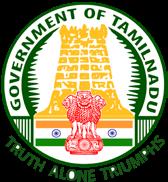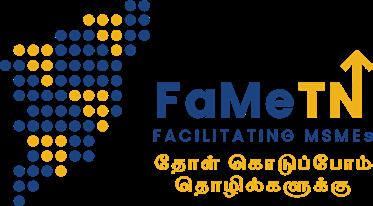




Edition: #3 September 2024

About FaMeTN:
We are the Bureau for Facilitating MSMEs of Tamil Nadu (FaMeTN), an organisation under the MSME Department, Government of Tamil Nadu. We support MSMEs with access to finance and markets, and nudge them along the path of sustainability. The FaMe Newsletter is a quarterly one, and through this newsletter we hope to create a greater conversation with you.
Thiru L. Nirmal Raj, I.A.S. Managing Director, FaMeTN
At FaMeTN, our vision centres around growth for Tamil Nadu’s Micro, Small, and Medium Enterprises or MSMEs. We springboard MSMEs to realise their dreams and nudge them towards growth. In this edition of the FaMe newsletter, we will explore the quality and sustainability initiatives of FaMeTN. Our focus on growth for MSMEs aligns with *Sustainable Development Goal (SDG) Eight—‘Decent Work and Economic Growth.’ However, how do we ensure this growth remains sustainable? Firstly, let’s address the importance of quality and sustainability.
Tamil Nadu’s economic trajectory over the next decade hinges on MSME growth. Looking ahead a century, we must consider air quality, water resources, soil health, and climate for our future generations. This commitment to sustainability, quality and growth aligns with *SDG Eleven—‘Sustainable Cities and Communities.’
At the MSME department, we promote quality and sustainability through schemes that encourage the adoption of technologies, promoting zero defect principles and energy efficiency. We educate and provide a green platform for our MSMEs by collaborating with World Resources Institute India (WRI India), Auroville Consulting, and the National Productivity Council.
As you flip through the pages of the third edition of The FaMe newsletter, you will explore how the MSME Department of Government of Tamil Nadu, empowers MSMEs to produce high-quality products and adopt sustainable development practices. These include ZED certification, LEAN principles and the PEACE scheme. Take a moment to encourage MSMEs who have led the way in the economic and sustainable development of Tamil Nadu.
*Source: https://sdgs.un.org/goals (UNSDG)

In today’s world, quality and sustainability are crucial for businesses. Tamil Nadu’s small and medium enterprises (SMEs) need to adapt to these parameters to stay competitive and environmentally friendly. This approach requires Tamil Nadu MSMEs to align with international standards and the United Nations Sustainable Development Goals (SDGs), driving progress towards a greener, more efficient future.
1. PEACE (Promotion of Energy Audit and Conservation of Energy): Helps MSMEs upgrade to energy-efficient measures.
2. Q-Cert : Offers subsidies for quality certifications, enabling MSMEs to compete globally and remain sustainable.
3. Awareness Workshops: FaMeTN organises targeted workshops and empowers MSMEs on sustainable practices and their long-term economic and ecological benefits, such as reduced operational costs, enhanced market competitiveness and reduced carbon emissions.

FaMeTN, in collaboration with various organisations of the Government of India, ensures the smooth implementation of the following initiatives:
• Zero Effect and Zero Defect (ZED) Certification: The ZED certificate enables a set of parameters to improve the quality of products made by MSMEs and maximise their profits.
• Competitive LEAN scheme: An initiative supported by the National Productivity Council (NPC), the Competitive LEAN scheme focuses on reducing waste and efficiently managing resources.
These efforts help MSMEs reduce their carbon footprint and support global climate change efforts, aligning with SDGs such as:
7 9 13
FaMeTN’s commitment to sustainable development includes partnerships with:
• Auroville Consulting: Focusing on policy advocacy and Green House Gases (GHG) accounting.
• World Resources Institute: Emphasising Green Skilling, especially in the Electric Vehicle sector.
THE IMPERATIVE OF QUALITY FOR MSMES
The significance of MSMEs in supporting large-scale industries cannot be overstated. The quality of these larger entities’ products heavily depends on the standards MSMEs maintain. Following high-quality standards is crucial for MSMEs’ operational success, growth and sustainable development. Superior quality results in fewer product rejections, enhances efficiency, and reduces waste, improving the financial bottom line for MSMEs.
For MSMEs, quality is more than meeting industry standards; it’s a strategic imperative for growth. Highquality standards help:

Resources: Provides necessary tools and resources to implement quality standards.
Maintain Global Competitiveness: Ensures relevance and competitiveness in the global market.
Minimise Rejections and Waste: Leads to higher efficiency and lower costs.
Secure Steady Inflow of Credit: Attracts credit support from buyers and financial institutions, providing necessary capital for reinvestment and innovation.
Quality is the cornerstone that keeps MSMEs competitive and relevant in a globalised market.
Training: Offers training programs on best practices in quality maintenance.
Support System: Establishes a robust support system to help MSMEs navigate quality standards and improve their operations.
Quality upgrades MSMEs’ operational standards. It strengthens their capacity to build reliable supply chains that enhance the performance of large industries.
By focusing on quality, MSMEs can reduce rejections, ensure financial stability, and unlock new growth avenues, enabling them to transition into medium or large-scale industries. The future looks promising for MSMEs that consistently focus on quality, allowing them to thrive and grow sustainably.
FaMeTN (Facilitating MSMEs in Tamil Nadu) is crucial in helping MSMEs enhance their quality standards. FaMeTN helps MSMEs understand and integrate the latest quality standards, making them aware of critical benchmarks needed to maintain superior quality.

Sustainability for MSMEs means adopting practices that ensure climate-resilient and reliable operations.
This involves:
By integrating these sustainable measures, MSMEs align with the United Nations Sustainable Development Goals (SDGs), thrive in a competitive global market, minimise their carbon footprint, and foster sustainable development.
BEYOND BUSINESS: MSMES AND THE PURSUIT OF SUSTAINABILITY
MSMEs, the backbone of the global economy, significantly contribute to employment and innovation but face resilience challenges due to environmental issues. MSMEs are in need of greening, decarbonisation, and climate resilience practices. Embracing sustainability enhances reputation, reduces costs, mitigates risks, opens new market opportunities, and allows MSMEs to future-proof their businesses while contributing to a more sustainable and inclusive economy.
FaMeTN acts as a catalyst in advancing sustainability within the MSME sector by providing:
Resources and Expert Knowledge: Our dedicated knowledge centre delivers insightful reports and updates on the latest sustainable practices.
Strategic Partnerships and Skilling Programs: Through partnerships and targeted skilling programs, we empower MSMEs to enhance energy efficiency and minimise environmental impacts.
Dynamic Awareness Campaigns: These campaigns boost overall sustainability performance and awareness.
By nurturing a sustainable and resilient MSME sector, FaMeTN ensures that MSMEs are not only prepared for the challenges of climate change but also thrive in a competitive, sustainable economy.
Energy efficiency refers to the amount of energy required to perform a task compared to the amount of energy used. This efficiency is determined through energy audits, which identify areas of energy loss and develop strategies to minimise or eliminate these wastes. Achieving energy efficiency means delivering the same output, or more, without compromising quality or comfort. Energy costs constitute a significant portion of production costs, so MSMEs must use energy judiciously to remain competitive. Reducing energy costs directly translates into increased profits for MSME units.
Commitment and support from top management are essential. The process begins with an energy audit by an accredited energy auditor who analyses data, performs measurements, observes operations, and recommends energy-saving measures. Prioritise low or no-investment measures first, followed by higher investment measures. The government supports these initiatives through the PEACE scheme, aiding in auditing and implementation.
• Switch off unnecessary lights and fans, and unplug devices and chargers when not in use.
• Use energy-efficient lighting, such as LED bulbs, and take advantage of natural light whenever possible.
• Optimise production schedules to reduce energy usage during peak hours.

About our expert:
Expenses range from Rs. 25,000 to Rs. 2,00,000, depending on the scale and nature of operations. A 75% audit subsidy upto Rs. 1,00,000 is available every three years from the Government of Tamil Nadu.
Energy savings lead to financial savings and enhanced profits, allowing reinvestment into business operations. Energy efficiency provides a competitive edge by enabling competitively priced products and services. It opens opportunities for global reach, market expansion, and long-term strategic advantages. Energy-efficient companies adapt seamlessly to evolving regulations and market conditions, leveraging advancements in technology to stay ahead.
An energy-efficient unit features:
• Strong management commitment and regular energy audits.
• Measurement and monitoring systems.
• Energy management systems and employee training programmes.
• Adoption of energy-efficient technologies and continuous process optimisation.
• Integration of renewable energy sources and leveraging government support programs.
Thiru J. Nagesh Kumar, director of the Centre for Energy, Environment, and Productivity, has three decades of experience in energy audit and management. A mechanical engineer with a doctorate in Energy Management, he served as Director of the National Productivity Council for 27 years. He is a professional trainer accredited by BEE and ISO 50001 EnMS and has conducted over 100 energy audits.


LEAN Process Training: Educates MSME clusters on lean strategies to improve efficiency by eliminating waste and optimising processes.
MoU for Decarbonisation: Raises awareness among MSMEs on global decarbonisation rules and helps them develop regulations for sustainable development practices.
• RISE-TN: Upskills Tamil Nadu’s automotive MSMEs to manufacture sustainable EV components, aligning with India’s 2070 sustainability goals.
• Energy Efficiency Workshops: Provide guidelines for energy savings using techniques like energyefficient motors and timers.
• Green Skilling and Green Jobs: Train MSMEs in eco-friendly technologies and sustainable practices.


FaMeTN also partners with Japan International Cooperation Agency (JICA), the World Bank, Climate and Clean Air Coalition (CCAC), and Bureau of Indian Standards (BIS) to promote green practices among MSMEs. Through strategic collaboration and support, FaMeTN helps MSMEs thrive in sustainable development, contributing to global sustainability goals and maintaining ecological balance.
An initiative by the Government of Tamil Nadu to encourage energy efficiency in MSMEs. The scheme provides a 75% subsidy, up to Rs. 1 lakh, for energy audits and a 50% subsidy, up to Rs. 10 lakhs, for implementing energy-efficient measures suggested by the audit, such as machinery replacement, retrofitting, and technology adoption.


A State Government initiative to incentivise MSMEs to attain quality certifications such as ISO 9000/ ISO 14001/ISO 22000, HACCP, GHP, GMP, BIS, ZED Rating, or other recognised international certifications. The government reimburses consultancy and certification expenses, capped at Rs. 2.00 lakhs for national and Rs. 10.00 lakhs for international certifications.
Mr Jagadeesan, Unitech Plasto Components Pvt. Ltd., Kancheepuram, Tamil Nadu.
Through PEACE, we settled our unit’s electricity charges. The General Manager of the District Industries Centre (DIC), Kancheepuram, educated us on energy-saving methods and aided in selecting an energy auditor. Following the auditor’s advice, we implemented changes that significantly reduced charges and enhanced our working capital. Grateful to FaMeTN and DICs for subsidies.
A Central Government initiative to foster eco-friendly manufacturing in MSMEs, boosting competitiveness by reducing flaws and environmental harm. It promotes a set of practices to improve quality and facilitate sustainable development.

A Central Government initiative to bolster MSMEs’ domestic and global competitiveness by employing diverse LEAN tools and techniques. It empowers MSMEs to minimise wastage and enhance productivity significantly. Lean encompasses three proficiency levels: Basic, Intermediate, and Advanced.
Mr Ravichandran, Conway Water Purifiers, Coimbatore, Tamil Nadu.
ZED certification has enhanced customer trust in my water purification enterprise by ensuring quality and safety. Beyond documentation, it drives ground-level transformation. Benefits include increased customer confidence, expo opportunities, and access to loans. FaMeTN, through the District Industries Centre, Coimbatore, supported my journey to achieve Bronze, Silver and Gold ZED certifications, springboarding our business prospects and credibility.

Scan the QR code to access the e-version of the newsletter.